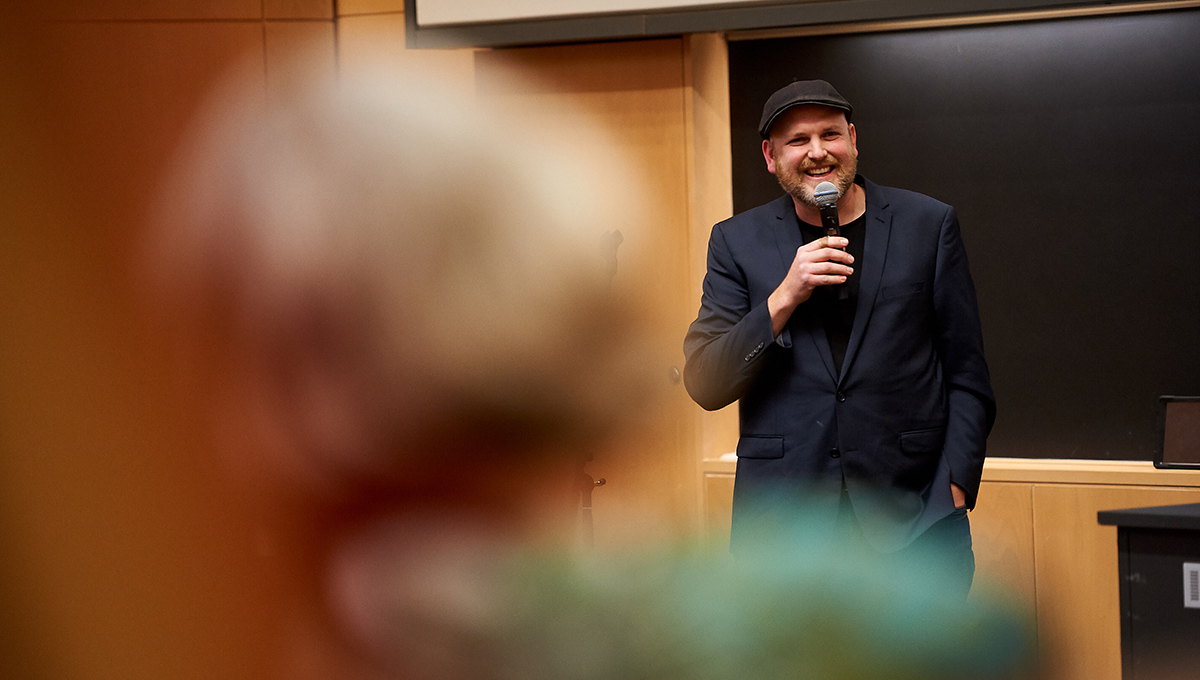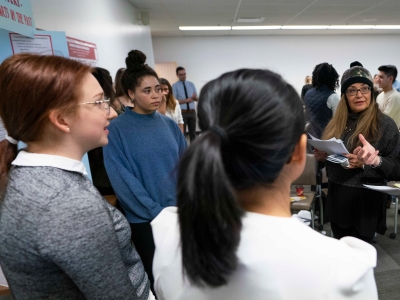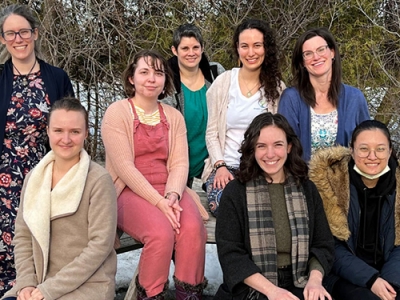By Lisa Gregoire
It started as a gift to friends and Facebook followers—a musical video a day for 40 days of quarantine to counteract bad news and boredom during the novel coronavirus pandemic.
Jesse Stewart, an award-winning percussionist, composer, multi-faceted artist and Carleton University music professor, can make music with anything. And in these videos, shot at home by family members, he shows us how. He plays beats on mixing bowls, cardboard boxes, brass address numbers, rotary saw blades, bicycles, floor tiles, even rock core samples.

Prof. Jesse Stewart
He also features obscure and mostly acoustic instruments from his 100-plus collection—a pitch bending thumb piano, an amplified palette, a wind wand, an auracle handpan and a euphone. Sprinkled among the 40 days are a few commissioned shorts and performance videos made before the pandemic, but most videos are new and low-fi and feature a joyful Stewart doing what he loves best.
And joy, like a virus, can be contagious.
Hundreds of people, sometimes thousands, started tuning in, commenting and sharing Stewart’s daily musical offerings. One in particular, “Different Strokes,” a composition he performed on canoe paddles, has been viewed nearly 30,000 times.
“I was really surprised by the reach those videos ended up having because I didn’t post them anywhere other than Facebook,” said Stewart.
“I think that the pandemic may well have lasting effects on the way we interact with each other. Online music-making, live-streaming and online concerts—I think even after the pandemic we’re going to see more of that.
“Music has capacity to bring people together, even when it is mediated by computers and the Internet.”

Making Music After a Six-Month Hiatus
Part of what makes these videos extraordinary is that Stewart had surgery in February to remove a benign tumour that had been pressing on his brain and optical nerve, causing significant pain and discomfort. For six months, he’d been unable to make music, so these videos also forced him to “think musically again,” and feel part of something larger.
“One of the things I love about music is the social dimension. Music, I think, can facilitate friendship and community and those are things I really value. And I missed that aspect of it. But I tried to, you know, keep active mentally,” he said, laughing.
“Sometimes I would practice in my mind.”
Stewart began playing drums as a kid and quickly diversified his repertoire as a percussionist to include a huge range of instruments and musical styles, including jazz, free improvisation and electronic. He has performed and recorded with musical luminaries from around the world and is in constant demand for collaborations and commissions.
But he has a special place in his heart for compositions on found objects, not just because it’s magical to coax sonic splendour from everyday things, but because anyone can do it. You don’t have to own a piano or a guitar, he said. Pots and pans will do.
And in fact, some of his biggest fans throughout this Facebook project have been music teachers looking for ways to teach students remotely during the pandemic. His videos offered them novel ideas for lessons on musical improvisation and composition using objects students could find at home. Parents stuck indoors with bored kids were also grateful for the musical diversion.
One of the biggest challenges of social distancing for musicians is that they can’t play together and Stewart feels this one hard. As a consummate collaborator, and someone devoted to musical outreach in the community through “We Are All Musicians,” an organization he founded in 2012, Stewart looks forward to the day when he can share music again in person.

Online Workshops and a Book
But, it’s impossible to know when that will be and what it might look like, so Stewart is exploring the idea of producing online workshops for children, people with disabilities, and maybe others who don’t have ready access to music-making. He doesn’t know what form those workshops might take, but it’s something to think about when you’re stuck at home.
Alongside that, Stewart has a couple other projects in the works.
He’s hoping to have a finished draft of Jamming in the Classroom within a couple of weeks. The book, co-written with Ajay Heble, explores teaching and learning improvisation in school and makes the case for musical improvisation as a vehicle for social change, since it models the values of democracy, listening, agency and mutual respect.
He has also been asked to co-edit, along with two colleagues, a special fall pandemic issue of Critical Studies in Improvisation, an academic journal published by the University of Guelph.
But what he’s really enjoying right now is learning how to play the euphone. Invented more than 200 years ago by Ernst Chladni, the instrument was promptly forgotten until the Baschet brothers in France rediscovered the sound and started building them about 50 years ago.
The euphone consists of 40 crystal rods that resonate when stroked with wet fingers, producing a rich, ethereal, almost pipe organ sound. Stewart, who owns one of these rare instruments, has been teaching himself how to play. And it’s wonderful, he says, to be a beginner again.



